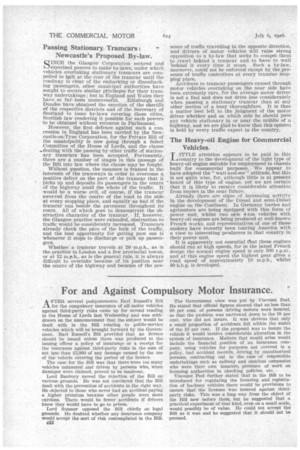For and Against Compulsory Motor Insurance.
Page 2

If you've noticed an error in this article please click here to report it so we can fix it.
AFTER several postponements Earl Russell's Bill for the compulsory insurance of all motor vehicles against third-party risks came up for second reading in the House of Lords last Wednesday and was withdrawn on the announcement that the subject would be dealt with in the Bill relating to public-service vehicles which will be brought forward by the Government. Hari Russell's Bill provided that no licence should be issued unless there was produced to the issuing officer a policy of insurance or a receipt for the insurance against third-party risks in the sum of not less than 0,000 of any damage caused by the use
of the vehicle covering the period of the licence. • The case for the Bill was that there were too many vehicles uninsured and driven by persons who, when damages were claimed, proved to be insolvent.
Lord Banbury moved the rejection of the Bill on, various grounds. He was not convinced that the Bill dealt with the prevention of accidents in the right way. He objected to those who never had an accident paying a higher premium because other people were more careless. There would be fewer accidents if drivers knew they would have to go to prison.
Lord Sumner opposed the Bill chiefly on legal grounds. He doubted whether any insurance company would accept the sort of risk contemplated in the Bill. c12 The Government view was put by Viscount peel, He stated that official figures showed that no less than 90 per cent, of persons driving motors were insured, so that the problem was narrowed down to the 10 per cent. who did not insure. It was obvious that only a small proportion of accidents fell within the ambit of the 10 per cent. If the proposal was to insure the vehicle it would involve considerable alteration in the system of insurance. Matters that would arise would include the financial position of an insurance company, using vehicles for purposes not covered in a. policy, bad accident records, driving by unauthorized persons, contracting 'out in the case of responsible undertakings such as railway and omnibus companies who were their own insurers, pressure of work on licensing authorities in checking policies, etc. ,
Viscount Peel further stated that in the Bill to be introduced for regulating the licensing and registration of hackney vehicles there would be provisions to ensure that the licensee Was insured against thirdparty risks. This was a long way from the object of the Bill now before them, but he suggested that a practical experiment of that kind, even on a small scale, would possibly be of value. He could not accept the Bill as it was and he suggested that it should not be • pressed.
















































